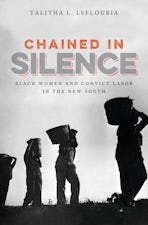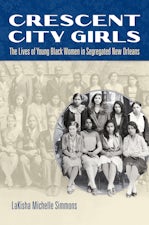The Criminalization of Black Children
Race, Gender, and Delinquency in Chicago’s Juvenile Justice System, 1899–1945
By Tera Eva Agyepong
196 pp., 6.125 x 9.25, 7 halftones, 2 tables
-
Paperback ISBN: 978-1-4696-3644-3
Published: April 2018 -
E-book PDF ISBN: 979-8-8908-5334-9
Published: March 2018 -
Hardcover ISBN: 978-1-4696-3865-2
Published: April 2018 -
E-book EPUB ISBN: 978-1-4696-3866-9
Published: March 2018
Justice, Power, and Politics
Buy this Book
- Paperback $28.00
- Hardcover $99.00
- E-Book $18.99
For Professors:
Free E-Exam Copies
Awards & distinctions
2018 Grace Abbott Book Prize, Society for the History of Children and Youth
In this important study, Agyepong expands the narrative of racialized criminalization in America, revealing that these patterns became embedded in a justice system originally intended to protect children. In doing so, she also complicates our understanding of the nature of migration and what it meant to be black and living in Chicago in the early twentieth century.
About the Author
Tera Eva Agyepong is assistant professor of history at DePaul University.
For more information about Tera Eva Agyepong, visit
the
Author
Page.
Reviews
“Provides a case study on race in Chicago’s juvenile justice system throughout the first half of the twentieth century. . . . Highlights the particular vulnerabilities that young African Americans face in a legal system supposedly designed to protect children’s innocence.”--Journal of African American History
“Brings significant insights to the fields of juvenile justice, childhood studies, and African American history.”--American Historical Review
“As a solid basis for social work advocacy . . . [The Criminalization of Black Children] offers a well-organized collection of historical accounts of how the juvenile justice system of Chicago created a racialized set of structures and procedures for the engagement and treatment of Black children during the domestic migration of Black families.”--Affilia: Journal of Women and Social Work
“Agyepong’s innovative take on the role of black children in shaping juvenile justice procedures is critically important for so many fields of history, including African American history, incarceration studies, and the history of gender and sexuality.”--Marcia Chatelain, Georgetown University
“Agyepong makes a compelling case for the centrality of black youth to understandings of delinquency, dependency, and, by extension, criminality at the foundations of the juvenile justice system.”--Davarian L. Baldwin, author of Chicago’s New Negroes: Modernity, the Great Migration, and Black Urban Life



